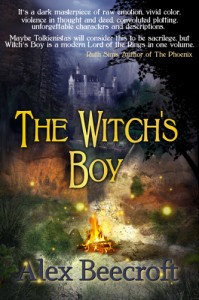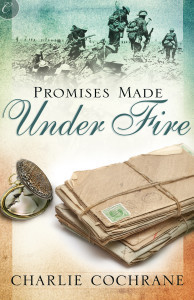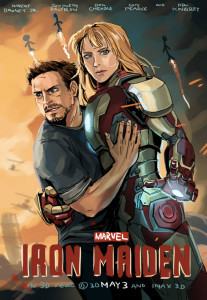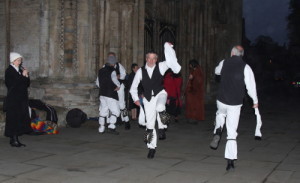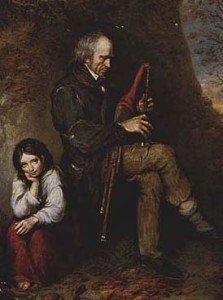Alex Beecroft's Blog, page 23
May 19, 2013
Sunday Snippet
ALEX BEECROFT
Blurb
Are the sins of the fathers really visited upon the sons? And is there no way of breaking that cycle? Is evil doomed always to repeat itself, ruining everything good through its tainted seed?
These are not the questions young Oswy is asking himself when he is sold to the witch-Lord Sulien FitzGuimar. He’s too busy wondering ‘why me?!’ They are, however, the questions which plague Sulien himself. Locked in a struggle for freedom, sanity, the very survival of his soul, Sulien must daily battle not only angels and demons, but the core of evil in his own heart.
When the King’s sorcerer stages a coup, dragging ancient magic, the elves, and the royal court into his Empire-building plans, the woman he has set his sights on as a bride – timid, aspiring nun, Adela – sets out to find someone to oppose him. It’s just unfortunate that the only candidates are cowardly Oswy, Adela herself and Sulien – who, deep in his heart, just wants to surrender and join him.
When the hope of redemption is balanced against the lure of revenge, which will prove stronger, flawed good or perfect evil?
Chapter one
The door slammed open. Light blazed into the darkness as a massive, brown haired man strode into Oswy’s cell. Scrambling to his feet, Oswy backed into the wall opposite, doing his best to look younger and more pitiful than his eleven years of age. It made no difference; within seconds he was pinned, an arm around his neck, one large hand clamped about both of his wrists. His heart hammered fiercely, and the humming started in his head, whining in counterpoint to his trembling.
Then the witch walked in, his blond hair tied back and his shirt sleeves rolled up. He carried a long thin knife and two large glass jars. To Oswy, hardly breathing now with fear, it seemed a shadow walked in with him, a shadow edged with bruise-colored fire.
“Hold the boy still,” the witch said, his light voice barely audible to Oswy over the scaling notes of panic in his head. “I shall want the eyes and tongue first.”
He came forward, the knife glimmering in his hand, his face full of anticipation. Oswy stopped breathing, stopped thinking, stood like a sparrow mesmerized by a snake, with his vision tinted red at the edges from the white noise of his fear, and the world stopping all around him, when suddenly the glass jars were wrenched from the witch’s hand and smashed against the wall. Some unseen force lifted the pallet and blanket in the corner of the room and flung them in his face. He brushed them aside as though they had no more weight than a curtain, and smiled.
An invisible assailant hit the other man hard, splitting his lip. “Lord!” he cried, looking about himself wildly, his hand raised protectively before his mouth.
“Get out,” said the witch, “Now.” And the brown-haired man fled.
Something was screaming. Glass shards were flying in a lethal whirlwind around the room. Oswy started breathing again with a great sob of horror – this was almost worse than sudden death – backed into a corner and crouched there, cowering.
“Stop it!” he shouted, “Stop it!”
“You stop it. It is your doing.”
“No it isn’t!” wailed Oswy, frightened in a whole new way now, both body and soul. “It’s not me!”
The witch paced calmly through the tempest of broken glass, the open door behind him turning his blond hair into a saint’s halo. Nothing touched him. For a long moment, he stood looking down at Oswy, then he drew back his hand casually and slapped him hard across the face. One of his rings left a long red graze.
Oswy burst into tears. Around him, in the sudden hush, came the crash and tinkle of glass fragments falling to the ground. He buried his face in his hands and sobbed.
For a short eternity the witch-lord stood, studying him as he wept. Then, tentatively, he went down on his knees and pulled away the hand that covered the graze. “Why are you crying?” he asked, “I have hardly hurt you.”
Wriggling further back into his corner, Oswy snatched his hand from the man’s grasp – just the touch of it felt filthy in a way that had nothing to do with the good clean dirt he was accustomed to. If only he could squeeze himself through the mortar of the walls; turn himself into a cloud and float into the sky. If only he was a great warrior who could fight back. If only… If only the man would go away!
Eventually the witch got up again, dusted himself down as if fear could be as easily brushed off as dirt. “This was done to teach you two things,” he said. “When we meet again I shall expect you to tell me what they were.”
He stood a little longer, watching Oswy cry, then he turned silently and strode out.
Some time later the brown-haired man returned, carefully gathered up the broken glass into a ragged blanket and, when he had finished, came gently over to where Oswy crouched.
“I’m Leofwine. And you?”
“Oswy,” it was difficult to get the breath out. He wanted them all to go away – the whole world to go away – so he could cry properly, on his own, in peace.
“Oswy?” Leofwine said, smiling, “‘Glory of the heathen gods’? Yes, well that seems appropriate. Listen then, I’m sorry we frightened you, but my lord Sulien felt it was important to do so, and he has his reasons. He’s gone off to Scricleah now, so there’ll be no chance of accidentally meeting him, should you choose to come down to the kitchen. Why not come where it’s warm, have something to eat?”
“Leave me alone.”
“It does no good to mope,” Leofwine frowned, straightening. “But I dare say I can spare you a few moments to recover your courage. Come down to the kitchen when you’re done.” He threw a contemplative, even sympathetic, look over his shoulder as he reached the door, but Oswy had the marks of the man’s fingers going purple about his wrists and knew better than to trust this reversal into mildness.
When he had gone, Oswy huddled back into his itchy rags and gave himself up to misery, contemplating the open door with bitterness. They were so confident of his obedience, of their legal possession, that the open door was more of a symbol of slavery than any amount of chains. Inside or outside that door, there was still nowhere to go. His father had sold him to the witch for the price of a good milk-cow and one less mouth to feed. No amount of tears could wash away the memory.
“Come here, lad,” his father had said. “We have a buyer for you.”
“I don’t want to go!”
Fear had been plain in his father’s face, in his shaking voice; “We have to, son. You know why we have to. But that aside, you don’t say no to this man.”
Inside their shabby hut the air had been rank with the smell of fear – bitter and humiliating at once. His mother and sister had hidden behind a blanket in the smoke-loft in case the Holmr lord should be insulted at the sight of women, and without them he had felt defenseless, exposed. His brothers’ gazes kept sliding away from him, to the hearth, where once he had lost his temper, and the cooking pots had burst apart. Ill-luck, they called him after that, and now the ill-luck had come home.
Against their squalor the witch-lord, with his poise and his fine clothes seemed almost godlike, deigning to haggle, his pleasant voice full of threat and amusement, playing with them.
Children grew up, in Oswy’s village, with this man’s name used as threat and blackmail against them. The rumors had been the climate of his infancy; the whispered hints, the stories the adults stopped telling when they saw him listening. He had never imagined the creature they spoke of could one day be sitting in his house, with a face carved and cold as a stone angel, and brown eyes which caught red glints from the fire, like a wolf’s eyes in winter.
Oh he had expected to be sold, of course. He knew how bad the harvest had been, that this was the only way his family would all make it through to the spring. Dreams had even shown him his new place in a Lord’s household – with two tunics, and bread to eat every day. He had been planning to work hard, be honest, to try and earn a little on the side so one day he could buy himself back. But those hopes died in him the moment he heard his buyer’s name.
Yet the door was open. The door was open, he was unshackled, the witch had gone on an errand and his household was giving Oswy a moment to compose himself. Why should I stay here, he thought, suddenly, with a flare of astonishment and defiance. Just to be cut up as ingredients for some witch’s brew? Why should I?
It was a heady thought. Was there anything out there that could be worse than belonging to Sulien FitzGuimar? Surely not. And therefore there was nothing to fear, other than staying here. Nodding to himself, fiercely, he wiped his eyes on the back of his hand, rearranging the dirt, and stood up.
The door made no sound as he pushed it further open. Pale sunshine lit the corridor outside, slanting in from arrow slits along the far wall. The autumn air carried the smells of water and smoke, the sound of starlings squabbling in the meadow beyond the moat, a bracing coolness.
An avid listener to tales, Oswy had followed the storytellers from village to village, learning the words. Now all the stories of heroes, who had escaped the dungeons of evil kings, came back to him, resting on his shoulders like an armor of strength. Straightening up, he began to walk quietly in search of the stairs.
A soft, muffled noise tugged at Oswy’s curiosity, drawing him as surely as glitter draws crows. The door of a corner room was ajar, the sound stealing out – clearer now – identifiable as the labored breathing of someone trying very hard not to cry. Oswy edged closer, peered into the darkness.
It took a while for his eyes to adjust, but at last, dimly lit by the corridor’s light, he made out a blond boy of about his own age sitting half naked in a chaos of knotted blankets and scattered clothes. He was lacing his shirt with hands that trembled. From a deep gash in his upper lip blood flowed splashing onto the white linen. He barely raised his head when Oswy came in.
“What happened?”
The boy said nothing.
His abandoned tunic, which lay by the door, was Holmr style, embroidered and costly. Under the spreading bruises his skin was clean; there was no smell of him on the dusty air. But the yellow hair, the pallor, the shape of his face, were all Sceafn. After some thought Oswy concluded; He’s a Holmr Lord’s bastard. Thrown away, now the legal heir has arrived. Half gentle, half wild. Rubbish, like me.
“What happened to your lip?” he insisted.
The lad looked up with the angry snarl of a child who has been very badly hurt, but does not want anyone to know it, “What’s it to you?”
“Hush, it’s fine…” Oswy tried reassurance, in the voice he used to tame the stray dogs that whined around the door at home. He crouched down and offered a hand, which was ignored, “I’ve been crying too.”
“I have not been crying!” the boy rounded on him with blazing eyes and clenched fists, his affronted dignity fierce and ridiculous, sharp but fragile as the broken glass. Still, Oswy knew better than to laugh.
He scuttled back a safe distance, “So what happened?”
Anger kept the boy bright for a moment longer, blazing like a spark. Then, like a spark, it went out and he slumped back against the wall, drained and surly. “He bit me.”
“I’m escaping.” With no idea what to reply to that and no desire to think about it long enough to form an idea, Oswy turned the pause with, he thought, impressive tact. “Come with me.”
“It won’t work,” shifting position gingerly, the boy shook his head, “There’s nowhere to go.”
“I’m going home.”
“Are you that much of a fool?” a hand went questing out, closed on blue linen hose. He pulled them on violently, without taking his challenging gaze from Oswy’s face, “He will have killed them by now. Even if he has not, they’ll be so terrified they bring you straight back.”
“Oh,” said Oswy blankly, and sat down by the edge of the pallet, some of the wind gone from his sails. The bastard was right of course, he could not go home.
“Noble or common,” the boy thawed visibly as he realized he was not going to be mocked, “Everyone fears him. You’d get no help. And if you didn’t tell them who you were running from – if you lied – when he came after you he would kill them. And that would be on your conscience for the rest of your life.”
“We could go to the city,” said Oswy after a moment’s thought. “He’d never find us there – among so many people. We’d only have to work there for a year and a day, and we’d be free.”
The boy glared at him, his fine dark eyes filled with misery and scorn beneath their long lashes. “That’s very well for you, you’re ugly. But I know what work they’d find for me in the City.”
Even Oswy, who was no expert on such things, could see he was a very good looking boy. He did not exactly understand, but he knew enough to know he did not want to learn any more. “Church then,” he said.
“They’d burn me.”
“Why?” Oswy edged nearer. Dispiriting though the conversation was, it was nice to have company in this place – so full of threat and evil memories.
“Because I see things,” said the boy, as if it should be obvious. “And I make things move.”
“So do I.” Competitiveness made the admission suddenly easier; “Make things move I mean.”
“They’d burn you too then.”
The knot that had unraveled in his chest when he made his decision to leave now began to tangle itself together again, catching at his throat, bringing back the threat of tears, and that was not something he was willing to indulge in front of this boy. “We could go to the forest.”
“We’d get eaten by wolves or monsters,” the little noble laughed bitterly, pressing his fingers to his lip and wincing at the sting, “Or caught by outlaws, which would be worse than the city. Or we’d starve. It’s no good, we’re stuck here.”
Quickly, before the despair stuck and made his temporary courage desert him, Oswy got up. “I don’t care. I’m going. At least I’m going to try. You can stay here with him if you like. I don’t care.”
He hurried to the door, but guilt and sympathy stopped him under the lintel, and he looked back at the misery on the boy’s bloodstained face. “What will you do then?” he said, quietly.
“Stay here,” the lad replied, with an unexpected resolve which made him seem suddenly formidable. “Wait until he gets used to me… Then I’ll kill him.”
Oswy paused again, and admiration of this plan washed over him. That was what noble blood did for you, howsoever it was diluted. On impulse he said, “If they catch me, will you be my friend?”
“I would be. But how can I? You’re not even real.”
Looking out to check the corridor was clear, Oswy managed a chuckle. “Don’t be stupid! Of course I’m real.”
He turned back to say goodbye, but the room was empty; no clothes, no mattress and no boy. There was dust an inch deep on the floor except where Oswy had walked and sat. There were spider’s webs around the doorway and in his hair. He thrust one grubby fist into his mouth and backed slowly into the corridor wall. It was cleaner there, the scrubbed stones a pale cream in the cool sunlight, but the hinges of that door were thick with rust.
“Sulien killed him,” said Oswy softly to himself. “He must have come back and killed him.”
He saw it all; the terrible murder, the boy’s ghost condemned to eternity in the place of his death, the servants too frightened ever to come near the room again.
“Oh God!” said Oswy at last, “I’ve got to get out of here!” He turned and ran for the stairs.
They were the gentry stairs, whitewashed and painted with zig-zags and bright lines. Oswy’s feet slapped sharply on them, the sound echoing up and down the spiral, but he was beyond stealth.
Where the steps were darkest there were lamps of glass. A smell of warm honey floated from the wax candles inside.
New friezes were painted on the walls, their gemlike colors glowing: A battle before the walls of Yocheved; the stars in their constellations; hunting at Shining Fell. It was not at all what Oswy had expected, and gradually the sheer beauty of it began to calm him down.
The stairs came to an end. There was a large ornate door to his right, but it was closed. The corridor stretched on before him.
Don’t run, he said to himself firmly, Sibyrt didn’t run in the monster’s den. Besides, they always stop you if you run. Nevertheless it was a great effort to walk quietly down the corridor and look inconspicuous as he turned the corner.
There were the great doors of the keep, standing open, with the meadowsweet scent of grass streaming through them on a cool wind. And a guard’s cell before them, the shadow of a guard huge on its wall.
Oswy dithered in the corner for a moment and then, taking himself in hand, he said a quick prayer and headed for the doors. He was just an inquisitive boy, the son of one of the servants, come in to gawp at the keep while the master was away. He strolled on.
The guard looked up from his knife curiously and watched him. Oswy walked on.
“Hey, Boy!” called the guard.
Oswy carried on walking. The man got up slowly, and Oswy increased his pace.
“Answer me,” the guard insisted.
Oswy was almost past him by now, walking fast, his heart pounding.
“Here. Stop!” Yelling, the guard reached for his spear. Oswy began to run.
Nothing stopped him as he pelted out of the keep doors, the guard’s footsteps loud behind him. Straight out and down the path he ran. It was past noon, bright and clear, the few people working in the enclosure could see him perfectly. Some paused in their tasks to watch.
The guard came running. “Stop him!” he shouted, “It’s the new boy. Don’t let him get away.”
Oswy dived for the cover of an outbuilding. A workshop of some kind; tools were scattered about the floor, beams propped on trestles. The roof was falling in, rotten thatch trailing, and the upper level was rickety, swaying under Oswy’s weight as he scrambled up the ladder. There was a worm-eaten barrel in one corner, filled with shards of glass. He wedged himself in the gap between that and the eaves.
Someone came in. He heard their feet shuffling in the sawdust, their breath soft beneath him. A second shadow darkened the door. Caught!
“He came in here,” said the man below.
“Nay,” said the figure in the doorway, a woman by the voice. “He did not.” There was a strange insistence in her tone. Oswy felt the man hesitate.
“Poor little lad,” the woman went on, “would it be such a bad thing if he got away?”
There was a silence, and then the man said, “Bad for us maybe.”
“Please…” prayed Oswy. There was the sound of movement at the foot of the ladder.
“Well,” the man sighed at last, “I’ve looked and I can’t see him.”
“Oh Brand,” the woman replied fondly. They went away.
He heard Brand shout, “Not in this one! Try the next,” and the sound of heavy feet retreating, but he dared not move, not yet.
Hours, he waited, at first on tenterhooks between relief and fear, then, as the short autumn day dwindled and no one else came, in increasing misery. It was cold. The smell of mildew reached deep into his throat, and he was cramped and hungry. Worse than that, he had time to think.
He wanted to go home. He wanted to be in his place by the fire, watching mother stirring the great stew-pot, listening to Cine and Freda quarreling, Wulf intervening with his patronizing elder brother voice, father watching, silent and exhausted on his bench.
Oswy’s mother always knew when he was afraid. She would come and sit beside him, busy with the baby, and tell him stories of the old heroes, in the days before the Holmr. He wanted very badly to be back there, for everything to be set right. He didn’t even know if they were still alive. Perhaps the witch had gone back and killed them all, as the boy had said he would, but he would never know. They would look for him first at home. He could not go back, not even to check.
He would go to the city, and find a trade. The city was only three days walk away, and he wouldn’t have any trouble there because he was ugly.
Really ugly? He felt himself prepared to cry even at this. Perhaps that was why they had sold him and not Wulf; they couldn’t bear to look at him. Would anyone in the city want to shelter him? His own family didn’t. And what if they brought him back, or the witch found him? Oh. He would be angry. It didn’t bear thinking about. Maybe he would just starve to death on the way, and then everyone would be happy.
The sound of people coming in to the enclosure for the evening roused him. There was the lowing of cattle, the staccato beat of their hooves, and chat among the cowmen. By the sound of it there was a fair herd being brought in to the byre.
Oswy knew cattle; how to calm them and make them accept him. It would be warm to sleep among them, and he could get milk. He edged away from the wall, stiff and sore from sitting, and went down the ladder gently.
He waited while the herd settled down, watching through a hole in the mortar of the wall while the cowmen and herd-boys left for their homes outside the bailey. Gradually as the sky darkened the compound emptied, until only the animals in their pens remained.
He heard the slam of the gates, two guards talking, their voices carrying far on the evening air. There seemed to be only two guards for the whole span of palisade, and so naturally, with the master gone, they were together by the fire in the guard-house.
Under cover of a clamor from the kennels he slipped out of the door and walked as calmly as possible between the gardens to the byre. His heart was racing as he reached it, but there was no alarm. He found a mound of cleanish straw, burrowed into it and went to sleep, waking up in the middle of the night to take a drink.
When he was warm and fed, and with the familiar smell of cattle around him, he felt better: He would go to the city and do well, and when he was rich someday his family would come to him for help without knowing who he was, just like Saint Asaph in the story, and everything would be put right.
He awoke again in the bitter cold of the early morning, with the dreary light of dawn just showing over the battlements. The cattle were stirring, nosing him curiously and eating his bedding. He rubbed dirt into his face and hands and made sure his bare feet were thoroughly muddy, so that no gleam of white skin would betray him. Then, coming out around the back of the byre, he edged along the walls until he could hide again behind a pile of rubble just by the left hand gate-tower, and wait for the gates to be opened.
Soon after dawn a guard came, blowing on his hands in the chill morning, let down the bridge with a great rattle of chains, and opened the gates. People began coming in almost immediately, but going out involved passing the lighted gate-house and he could not bring himself to do it.
The sky began to lighten. Two horses were led out to exercise by a vacant faced old man wearing a cast off tunic at least three times too large for him. Maids came in, barefaced, with empty pails, giggling. The cattlemen strolled in in a knot together talking stock, two herd-boys, exchanging insults, running before them. Oswy watched them carefully, with the glimmering of an idea.
He waited, losing more of the darkness, until the cattle began to come out. Then as they jostled past him he darted out of hiding and in among them. Shouting “Coo-oop” and hitting the bony rumps like a zealous herder he passed the shadow of the gate, turning his face away from the gaze of the guard.
At a brief glance the world seemed very wide to him as he passed into it. Then the cows barged into him and one of the herd-boys said “Hey! You’re not…” and he was running again.
Down the steep hill he charged while the cattlemen conferred with leisurely dignity behind him, and across the boulder-strewn strip beyond. By the time they had decided to send a lad back to tell the guard he had passed into the forest and was hidden in the dense undergrowth.
He had made it. He was free.
~
The Witch’s Boy is available from Smashwords or in print from Lulu
May 17, 2013
Hop against Homophobia and Transphobia
So, today is International Day Against Homophobia and Transphobia http://dayagainsthomophobia.org/ and to mark the day lots of people around the web are taking part in the (blog) Hop against Homophobia and Transphobia.
I was amused in a slightly sad and bitter way to find that the instructions that came with participation in this event refer to it as the Hop against Homophobia, and in the ‘what to include’ section offers the advice to ‘give your message on homophobia’ and ‘do whatever else you feel like: link to sites you’re familiar with that focus on fighting homophobia’. Look at that URL again if you don’t believe me.
I’m all for blogging against homophobia, but it’s a sad reflection of society’s priorities that even the ‘how to’ section of the ‘hop against homophobia and transphobia’ forgets to mention the possibility that you might want to blog about transphobia instead.
As the mother of a transgender child, I’m very aware of how the world is stacked against him. It was OK when he was pre-puberty and everyone assumed he was a boy anyway, but puberty heralded bullying and withdrawal and endlessly having to think up reasons why he couldn’t go swimming without a wetsuit, why he couldn’t do PE at school (where he would be forced to use the girls’ changing rooms,) why he couldn’t go into toilets when he was outside the house, leading to him giving up drinking altogether, etc.
They’re all little things, I know. Little things attended with massive existential anxiety. Little things attended with society’s constant incomprehension that there’s even a problem – its attempts to push the blame on him for being difficult. I’m not even mentioning the statistics on self-harm and suicide among transgendered children, although as a mother I live in fear for him. And I’m not even mentioning my continuing fear that he will be targeted for transphobic violence or even murdered, as happens to so many transgender people.
But I am thinking, damn, it’s hard when the very movement that’s apparently set up to raise awareness of this decides he doesn’t exist, or that his problems are not worth talking about.
So, rather than get all angry, I’ll use this opportunity to big up the Tavistock and Portland Clinic, who are doing something constructive:
http://www.tavistockandportman.nhs.uk/GIDSresearch
and the NHS which has so far been more understanding and more helpful – and more willing to believe him – than I had ever been led to believe.
~
In accordance with the blog-hop instructions I’ll be offering a book to a random commenter, so check back in a few days to see if your name came up and if you need to tell me where to send it.
Also, since this is a sensitive subject that can easily devolve into arguments in which real-life people get hurt, I will be strictly monitoring and controlling the comments. In contrast to my usual behaviour on my blog, I’m not interested in an intellectual debate about this. I have done the debate already and I’ve come down on the side of believing my son.
~
May 15, 2013
An interview with Charlie Cochrane
LOL! It looks like we planned this as a swap, but actually it just turned out this way. Charlie’s one of the first people I ever got to know in this genre, and still one of the nicest. It was a great experience, coming in as a new author to have a posse of people to hang out with and keep each other encouraged. Much has changed since the days when Charlie, Erastes, Lee Rowan and I set up The Macaronis and were mostly of one mind about historical fiction, but the friendship doesn’t wane.
Anyway, enough of that, and on to the interview 
What upcoming project of your own are you most excited about?
You’re going to see a theme for my answers, in that you’ll ask me for one example, and I’ll give you three. Or more. Maybe I’m generous or maybe I’m just too loquacious. I was the same in exams, always wrote too much.
The definite thing I’m most excited about is the next Cambridge Fellows book, Lessons for Suspicious minds, which should be out around September. It goes back to 1909, so Jonty’s parents will be swooping in on Mrs. Stewart’s broomstick!
The indefinite things are even more exciting, but they’re all “don’t know yets”. I have a story long listed for a mainstream anthology, another entered in a competition and a story submitted to an agent.
Who is your favorite fictional character created by someone other than yourself?
Going to have to give more than one.
Aragorn, of course, because he’s handsome and tough and noble and heroic and just…cor.
Laurie Odell, because he’s beautifully depicted, wonderfully authentic and just a bit tragic.
Miss Marple, because she’s so well observed. In terms of wheedling out sensitive information, MI5 would be better off employing old ladies than young studs.
What are you enjoying reading at the moment?
My bargain basement treasures. I picked up six volumes of illustrated yearbooks from 1911 through to 1916, full of news and pictures and wonderful stuff. The fact that they came to £3 in total gobsmacked me. Clearly this is an era I read and write about (most of my books are set in the early years of the twentieth century) so not only will they be great for research, they’ll hopefully provide a plot bunny or two.
I always say you can’t beat contemporary sources for both research and inspiration purposes. You get a feel for the cadence of the language, for one thing.
Tell us about the books you have out
Blimey. There are so many of them, from short stories through to series – where to start? I’ve written about Weresloths, cross dressers, Regency curates, Paralympic swimmers and, of course, Cambridge dons who like to do sleuthing on the side. My most recent book takes me back to what seems to be my comfort zone, WWI. Promises Made Under Fire is about what happens when just about everything you knew (or thought you knew) about your best friend turns out to be a lie.
There are more stories, of course; the easiest way to find a list of/links to all my stories is down the left hand side of my blog!
What type of music, if any, do you listen to while you write?
Any and everything, so long as it requires no concentration. Sometimes I listen to sport (football is especially useful as it’s pretty bland) or audio books/radio drama, but they tend to be a touch distracting. I’m listening to Stylo by Gorillaz at present, but that could as easily be the Beach Boys or Luciano Pavarotti.
Do you think you have specific themes you continue to return to? If so what are they?
I have certain eras, definitely. Writing 1900 to 1920 feels like coming home, maybe because I’ve always read and enjoyed so many stories from around that time (Jerome K Jerome, Conan Doyle, etc). As for themes, I guess that one I tend to return to is a pair of manly men, if that makes sense. My heroes are rarely in the outwardly effeminate end of the spectrum (except for Francis from “All That Jazz”) and usually like sport and showing their affection by insulting each other.
I suspect a faith element usually plays a part in my plots, although maybe that’s my own spirituality coming out?
What one thing are you the most proud of in your life?
I should probably say producing (with the help of the long-suffering Mr. Cochrane) my three beautiful daughters, but if I’m allowed to be entirely self centred and shallow I’d say
a) my double first from Cambridge
b) having fed Red Rum a Polo mint
c) the fan e-mails I get from gay men
Do you characterize by observation or introspection?
Alex, I don’t even understand that question. I am the world’s worst at analysing my writing (or plotting a story or anything else which is remotely sensible). What did Adrian Plass say? Something like “Writing is easy, you just sit at a typewriter and open a vein.” I just sit down and see what appears on the screen. (Do not try this at home, folks!)
Who is your favorite author and what is your favorite genre to read?
How long have we got? I read all sorts of stuff, fiction and non-fiction. Among my favourites are:
Jerome K Jerome, for his humour. Jonty and Orlando are heavily influenced by the three men in their boat.
Patrick O’Brian for use of language, breadth of vision and fantastic characterisation.
Mary Renault for being able to say more in one line than most writers can in a whole page.
Have you seen those ‘author’s cave’ photos that show the office/study/corner of the table where famous writers work? What does yours look like?
The Cochranes had a bit of a move round last year, swopping three rooms about, so our study is a converted bedroom. It’s east facing so gets lots of morning sun, is light, airy and has a view over both gardens and fields and the M27. (I’m a London girl, I don’t mind watching a bit of traffic.)
There’s a desk in here, a bookcase, a couple of comfy chairs, a filing cabinet and a Bose system, for that all important music and sport. I “Cox and Box” in here with Mr Cochrane, who is very tidy, which is just as well. It could be awful if one of us was a neat freak and the other wasn’t!
You can reach me at cochrane.charlie2@googlemail.com (maybe to sign up for my newsletter?) or catch me on Facebook, twitter, goodreads, my website or my blog. All over the place like a rash, really. I tend to blog about anything that takes my fancy, so I can promise that it isn’t all “Buy my book”. I have author guests every month, which is smashing fun (they always have such interesting answers) and I may just mention rugby occasionally. Sometimes. Once or twice a year.
May 14, 2013
Lovely Charlie blogging for me
So, my dry spell continues, as you can tell from the state of the blog. But I can at least manage to rouse myself and say “Look! I’ve been interviewed by Charlie Cochrane, the star and inventor of sweet m/m, the author of the well beloved Cambridge Fellows series.”
Charlie always thinks of really good questions, so if you ever wanted to know which imaginary fellow of mine to take along on a potentially perilous date, you can find the answer here: http://charliecochrane.livejournal.com/268181.html
As for me, I am finally writing again – working on Blue Eyed Stranger – but I haven’t yet got enough tension in my spring to manage blogging as well. It will come, eventually. In the mean time, thank you ever so much to Charlie for having me 
May 8, 2013
Iron Man 3
I don’t really have a lot to say about this. It was well made and entertaining, but it was nothing we haven’t seen before, and I think the attraction is wearing thin.
I was uncomfortable with the Mandarin as a villain right up until the point where it was revealed that he wasn’t actually the problem, after which I was a bit mollified but it still left a bad taste in my mouth. Is it OK to demonise someone if you then go “Haha! It was just a bluff.” Does it reflect badly on the film makers or does it just reflect badly on the film’s villain and thus make him more villainous?
I have to say that the Iron Man films have a remarkable run of creating villains who I don’t feel tempted to sympathize with whatsoever – villains who it’s really easy to both believe in and despise. This is an under-rated talent, IMO. After all, my resistance to heroes is so high that I generally end up cheering on the villains. I even rather liked Red Skull from Captain America. But while I think Ben Kingsley was the best thing in Iron Man 3, I’ve never been tempted to root for an Iron Man villain. Whether this is because Iron Man’s villains are so small-minded, so petty, and so clearly already possessed of everything that any rational person should learn to be content with, or because Tony Stark himself is drawn as a human enough hero to care about, I’m not sure. Maybe it’s both.
Still on the subject of the Mandarin, though, LOL, bless! Ben Kingsley can out charm Tony Stark any day.
Pepper in the suit was a disappointment, but Pepper with amazing fire powers was a pleasant surprise. Rhodey was awesome and I would probably watch a film in which Rhodey and Pepper teamed up to fight crime, with Jarvis as backup. Tony himself, meh. I’ve had enough of him for now. (Which made me quite approving of the ‘Tony hangs up his electromagnet and quits the superhero gig’ ending. Good for him. It was probably about time.)
May 3, 2013
Crash and reset
You may have noticed a sudden and dramatic reduction of my blogging over the last week. The truth is I’m having a sudden and dramatic reduction in everything. I think this is connected to DH going back to work, although Youngest being ill and me still being sleep deprived after May Day are also factors that are not helping.
I’m between novels at the moment and can’t think of a new idea I want to write. I would like to think it’s just my brain telling me that OK, I’ve worked pretty hard at creating output since September last year and I need a holiday to recharge. But naturally my brain is also telling me that this is it. I will never get up again. If I don’t push myself to do something now, I will never write again. I’ve run out of things to write about. I am a damp rag twisted to the point where no water is left to be squeezed out, and now there’s nothing left but to lie around being limp and parched for ever more.
Don’t you just hate the artistic temperament sometimes?
Anyway. I am telling myself that it’s fine. I can have the rest of today and the weekend off, and we (my brain and I) will start work again on Monday. Despite the fact that I told myself the same thing last Friday, I’m trying to believe it this time.
Does this happen to any of you? Most people I talk to seem to have more ideas than they have time to work on them. Is it really only me who has to wait for the next one to come along?
May 1, 2013
The sun rose this morning. That’s my job done for the year.
On May Day morning, about 4.30am, the stalwart members of Coton Morris Men and the Ely and Littleport Riot rolled out of bed, put their bells on and journeyed to Ely Cathedral. There they performed the ancient dances of their folk, starting in the icy darkness before dawn, to encourage the sun in its journey into the sky.
Thus, though their hardy musician suffered a painful numbing of her fingers such that the music became a great labour unto her sore hands, still they capered on until with a great burst of golden light, behold
The sun arose upon Ely cathedral, and also upon all those other places in the world, such as Harrogate, and Ipswich and Shingay-cum-Wendy. Then, seeing that the regular rotation of the earth and the celestial bodies had been preserved, the dancers cried the ritual words, “blimey, I’m cold. How about breakfast?” And there was great rejoicing.
April 30, 2013
Nine Naughty Novelists have a plus one
and I don’t think I’m particularly naughty at all. Stolid, I would have said. Mind you, I get round that by redefining the things I want to do as being perfectly innocuous and normal, so perhaps others might disagree.
In case I’m not being very clear, here I am on the Nine Naughty Novelists blog http://ninenaughtynovelists.blogspot.co.uk/2013/04/guest-blogger-alex-beecroft-some.html
talking about the un-PC nature of erotic fantasy, and whether we should really worry too much about Fifty Shades of Grey.
I apologise for there being no Write On post yesterday, but Sunday and Monday were taken up by my regular monthly migraine, so I gave myself a break. Normal service will be resumed next week, I hope.
In the mean time I offer what I was reading as a recommendation and apology. Even if you’ve never watched Stargate Universe (into which I’m getting sucked more and more with each episode), if you like explorations of human consciousness… in space, with explosions and aliens and mind melds and stoic but heartbreaking slash, you’re sure to like this one. It’s epic 
Force over Distance by Cleanwhiteroom
April 27, 2013
If I was a D&D character
But I like to play a thief! (Or sometimes a Paladin.) Cleric is the most boring option out there 
I Am A: Lawful Good Human Cleric (6th Level)
Ability Scores:
Strength-11
Dexterity-11
Constitution-10
Intelligence-11
Wisdom-13
Charisma-12
Alignment:
Lawful Good A lawful good character acts as a good person is expected or required to act. He combines a commitment to oppose evil with the discipline to fight relentlessly. He tells the truth, keeps his word, helps those in need, and speaks out against injustice. A lawful good character hates to see the guilty go unpunished. Lawful good is the best alignment you can be because it combines honor and compassion. However, lawful good can be a dangerous alignment when it restricts freedom and criminalizes self-interest.
Race:
Humans are the most adaptable of the common races. Short generations and a penchant for migration and conquest have made them physically diverse as well. Humans are often unorthodox in their dress, sporting unusual hairstyles, fanciful clothes, tattoos, and the like.
Class:
Clerics act as intermediaries between the earthly and the divine (or infernal) worlds. A good cleric helps those in need, while an evil cleric seeks to spread his patron’s vision of evil across the world. All clerics can heal wounds and bring people back from the brink of death, and powerful clerics can even raise the dead. Likewise, all clerics have authority over undead creatures, and they can turn away or even destroy these creatures. Clerics are trained in the use of simple weapons, and can use all forms of armor and shields without penalty, since armor does not interfere with the casting of divine spells. In addition to his normal complement of spells, every cleric chooses to focus on two of his deity’s domains. These domains grants the cleric special powers, and give him access to spells that he might otherwise never learn. A cleric’s Wisdom score should be high, since this determines the maximum spell level that he can cast.
Find out What Kind of Dungeons and Dragons Character Would You Be?, courtesy of Easydamus (e-mail)
April 26, 2013
Last to see Iron Man 3
My daughter went to the midnight screening in London, and my son went to see it immediately after his drama exam at the matinee today. Daughter says “just as good as Iron Man 2″, and son says “it was OK, but we missed the first ten minutes and I never figured out what was going on.” If it was possible to be jealous of your own children, I would be, but fortunately it isn’t, so I will just see it some time this weekend and be careful to arrive early.
Morris dance practice season is almost over, to be succeeded on May 1st by Morris dance-out season. We (where ‘we’ = both the Coton Morris Men and the Ely and Littleport Riot) will be dancing the sun up outside Ely Cathedral on Wednesday morning. So if you want to come along at 5.20am, to watch us set in motion the machinery that keeps the sun rising all year long, you’d be very welcome.
DH and I are trying to learn the melodeon, on a very old single-row instrument loaned to us by one of the other musicians. The main problem seems to be figuring out where the notes are, which DH has solved with a tuning app on his phone. If it was mine, I’d label the buttons, but it isn’t, so I can’t. We are just about able to pick out “Bluebells of Scotland” on it, which feels like a major achievement.
I’ve been looking at practice chanters for the Uilleann pipes on ebay, which you seem to be able to get for £25, though an actual playable set of pipes isn’t available for less than about £200. But everyone says they take at least 7 years to learn, and I don’t think I have that sort of persistence. I should probably just stick to the whistle.

